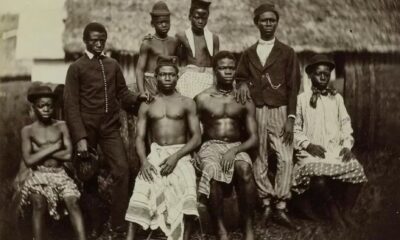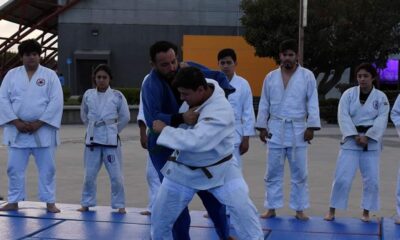He would have been one of Africa’s billionaires. He was fair-skinned, spoke softly and warm smiles danced on his chubby cheeks accentuated by a not-too-bushy moustache. He was relatively very young but as at that time, he was very well-known and duly respected in the Nigerian business society.
Here is the story of a man of many sides, Chief Victor Nnamdi Okafor, the Eze Ego (King of Money) I of Ihiala aka Udu Bunch aka The Young Millionaire, the Igbo tycoon who died tragically at a time he was to be celebrating his birthday.
EARLY DAYS, EDUCATION AND GROWING UP
A first son and a native of Uzoakwa, Ihiala in Anambra State, the late Ezego was born on the 25th of December, 1964. Ezego’s story is often touted as one of the classic rags-to-riches stories in Nigeria. He had his primary school education at the Uzoakwa Primary School but he was forced to drop out in the secondary school, Abbot Boys’ Secondary School, Ihiala and eventually took to business.
His childhood was a very traumatic one and at a point, his own father reportedly disowned him when he was nabbed for being a member of a robbery gang that showed Onitsha traders hell on earth .
THE ESCAPE, BUSINESS AND MAKING MONEY
While some of his fellow gangsters were caught and punished, Ezego fled to Umumeni Village where his angry father was said to have driven him out. From there, he went to Umuduru, his mother’s village. However, things were not rosy for him at Umuduru and in 1989, he decided to move to Lagos where he joined a mentor. What happened years after that remain shrouded in mystery but the next time the world would be hearing of Ezego, he was already a multimillionaire, one of the crème de la crème of Lagos.
In Lagos, he set up the Ezego Shopping Complex on Allen Avenue (there was also a branch in Abuja) and also the Ezego Plaza on the Murtala Muhammed International Airport Road. From these spots, he operated and controlled one of the biggest electronics store in Nigeria. His other companies were Vic-Winners International Limited, Ezego Nigeria Limited, Ezego Holdings Limited, Vitex Zinc Co. Limited and Ezego Properties Limited.
Gate to his mansion
HIS WEALTH AND PROPERTY
Ezego built houses, villas and mansions all over the country, one of which was an made of glass. All his real estate as at 1999 outside Ihiala was put at about half a billion naira.
The expansive mansion that served as his country home in Ihiala was worth another N500 million with the marble used for the walls imported from Italy.
A LOVER OF CARS
As at the time Ezego was alive, he had one of the largest private car garages in all of Africa. He loved cars and was always purchasing the latest ones stocking his garages at Ihiala and Lagos. A car freak of the first class, his garage alone was valued at almost one billion naira. He once dropped N14 million to acquire just two posh cars: a Sedan Lincoln Continental Mark 8 and a Mercedes Benz R230 convertible from Moontrends, owned by Tayo Ayeni.
Actually, as at the time of his death, he left behind countless state-of-the-art cars, 70 houses all over Nigeria and overseas and over N10 billion naira in his bank account.
LOVE, FAMILY, ROMANCE AND MARRIAGE
He was married to the fair-complexioned and beautiful Laurita Nkechi, a princess from Akata in Imo State and the marriage produced eight children. Following the death of her husband, Princess Nkechi relocated from Ajao Estate where she had stayed with her husband to Lekki. As at December 2013, it was reported by Nigeria Business Guide that she was taking her husband’s business empire to greater heights with her children in top universities around the globe.
By the way, Ezego’s first son was from a Japanese woman. He also fathered kids with other women apart from his wife, Nkechi.
On Thursday, 14th March, 2002, there was a case (Suit Number CA/E/166M/2000) before the Court of Appeal, Enugu Judicial Division and it was between Ezego’s wife and Ebun-Olu Adegboruwa on one hand as the appellants and Mrs. Elizabeth Onedibe, Citizens International Bank Limited, Zenith International Bank Limited and Diamond Bank Limited on the other hand as the respondents. Ezego had his accounts with these three banks.
HIS DEATH
On the 25th of December, 1999, death came knocking on Ezego’s door. But, he was not even aware in the slightest. Ezego’s birthday was on the 25th of December and it was his usual tradition to storm Ihiala, his hometown every Christmas for the double celebration (actually, it was a triple celebration: his birthday, Christmas and the New Year). His kinsmen and women in Ihiala eagerly awaited his annual homecoming which meant a lot of goodies for everyone. And so it was that fateful December of 1999. Ezego and everyone in his family were in high spirits and plans were fully made for the trip back home.
Ezego was in the habit of storming the sleepy, rustic hometown of Ihiala, impressing his people with his legendary wealth and affluence. Thus, the 1999 edition was no different. The whole of Nigeria would know that Ezego was in town. Some of the most sought-after musicians in the world’s most populous black nation were billed to entertain the guests at the most exciting galore of the year. Afrobeat maestro, Femi Kuti and his Positive Force Band were billed to dazzle the guests and rock the community to its very foundation.
To show how serious Ezego took the party, the moneybag personally visited the Afrikan Shrine to meet Femi Anikulapo-Kuti in order to ensure that all went on smoothly. The party was billed to start from the night of Christmas to the Boxing Day (26th) so Ezego decided to start his trip from Lagos on the 23rd of December. But little did he know that all his efforts were in vain. He was unconsciously planning for his own funeral. But what precisely happened?

On the 23rd of December, Ezego left Lagos as planned, heading towards the southeastern region of Nigeria. He took off in a most flashy style, in a convoy of six of his finest automobiles. These included a Lincoln Navigator (1999 model), limousine, blue Porsche, Lexus jeep, a Cherokee jeep and a latest Honda. The interesting thing about that fateful trip was that Ezego would normally fly to either Enugu or Port Harcourt where he would then be driven in a convoy to Ihiala. However, the fatal rates of air crashes during that period claimed to have made him change his mind. The outcome was disastrous for the mogul.
For some unknown reasons, Ezego decided to get behind his Lexus jeep in the convoy and drive himself all the way from Lagos to Ihiala. But somewhere along the Lagos-Ibadan Expressway, the first trouble reared its nasty head. Trouble started when the Cherokee’s jeep’s engine became faulty. But Ezego was in a hurry and could not even entertain the idea of missing his schedule and arriving on time. So he decided to keep ‘managing’ the jeep for as long as possible. But by the time the jeep got to Asaba in Delta State, the car broke down completely in the oil-rich state. Now, things were not getting funny anymore. Ezego was obviously in distress. His people were waiting for him back home so the carnival would start in earnest but here was his car that he shelled out of millions of naira for, giving him the worst headache of his life at a most unexpected moment.
But you know how dangerous Nigerian roads are . Ezego did not want to leave his cherished automobile in the middle of nowhere in Asaba at the mercy of robbers. Not the car he bought with so much money. So, he bellowed at one of his boys to purchase a chain so the jeep would be towed. The lad returned with the chain, which was then attached to the faulty jeep. However, that was the beginning of his problem because Ezego was said to have insisted on towing the broken-down vehicle all by himself with him driving the Lexus pulling the Cherokee. So he was in front while another of his boys was behind the wheels of the Cherokee. Well, no one was in a position to argue with the boss, so they continued their trip until that fateful moment when they reached a spot between Ozabulu and Okija on the Onitsha/Owerri Road. At that point, they were just two kilometers away from Ihiala in Anambra State, Ezego’s hometown and their final destination, and that was when death decided to unveil his dreadful figure.
Ezego reportedly ran into a damaged portion of the road while he was going down a steep slope and all of a sudden, he stepped on the brakes. The driver of the Cherokee behind him was caught unawares and as he was not even prepared for the sudden stop, he suddenly rammed the Cherokee into Ezego’s shiny Lexus, sending the millionaire tumbling down a deep ditch by the roadside. It must however be noted that there are some other slightly different accounts of precisely how the accident happened.
Other reports stated that it was actually the towing chain between the two jeeps that snapped, thus forcing the Cherokee at the rear to ram into Ezego’s Lexus making him lost control and plunging into that horrible ditch. Immediately this happened, his convoy was thrown into a pandemonium. Those in his convoy made frantic and desperate efforts to get him out of the ditch and get him the most effective medical attention promptly. By the time they finally succeeded in getting Ezego out of the ditch, he had sustained a deep gash and his face was massively puffed up, thus disfiguring his handsome face.
He was rushed to the nearby Lady of Lourdes Hospital (where Ezego incidentally made a donation of N15 million naira a few years before the accident).
He was still alive and stable when they brought him to the hospital and all the medical workers went into an overdrive to save the life of a man they know as a mentor and generous giver. However, things got worse and to make matters even more frightening, there was no doctor on duty. By the time a medical doctor eventually showed up, Ezego was already bleeding through his mouth, he was having internal bleeding and was already in shock. All attempts to stabilize him failed.
At that point, his family members suggested that he be quickly moved to a better-equipped hospital in Port Harcourt. At this point, his tale becomes hazy as it is not known whether he finally died while he was on his way to Port Harcourt or while he was being prepared for a flight to Lagos from Port Harcourt. Ezego died on the 26th, Boxing Day. He was just 34.
Eze Ego’s residence left in total ruins
THE AFTERMATH
However, his community is yet to forget him. Those who were old enough to remember him still miss him sorely while those who are teenagers now barely have an idea of who he was. After Ezego’s death, the same fate that befell many African entrepreneurs crept in, and his vast business empire collapsed. In December 2013, YES International! revealed that Ezego’s empire had collapsed and the majestic house he built at his hometown of Uzoakwa Ihiala was a ghostly shadow of its former self:
For instance, the flowers and street lights that hitherto beautified his popular Ezego Road have either been vandalized or over grown by weeds. Even some parts of the road have been washed away by erosion. The popular entrance to the inviting Ezego Crescent has also lost its beauty and glory, as the heavenly trees and flowers that used to welcome visitors are gradually dying off. His magnificent country home, 15 years after his death, is seriously crying for a new look. It is also fast falling apart and begging for attention. In fact, some parts of the glass house have started falling off and decaying. Even the uncompleted duplexes inside are still the way he left them.
His pretty and very fair-complexioned wife was said to have married the family lawyer and precisely what happened to his property and estate is still a controversy.
The controversies in Ezego’s life did not subside even after his death. His lawyer and the person that was responsible for the execution of his will, Barnabas Igwe was murdered in cold blood, with his wife, Abigail on the 2nd of September, 2002, barely three years after Ezego’s demise. Ezego’s will was thus, never read, and the exact beneficiaries are not known (at least as at January 2006).
The Inspector-General of Police, Sunday Ehindero, was called upon to investigate all leads (including Ezego’s widow and a former police commissioner) relating to the murder of the Igwes but like many murder cases in Nigeria, it led to nothing useful. While the former governor of Ezego’s Anambra State, Chinwoke Mbadinuju, was accused of having a hand in the killings, others stated that the lawyer was killed with his wife in relation to the tussle over Ezego’s will and property.

 IN-THE-NEWS10 months ago
IN-THE-NEWS10 months ago
 METRO10 months ago
METRO10 months ago
 SPORTS11 months ago
SPORTS11 months ago
 HEALTH & LIFESTYLE7 months ago
HEALTH & LIFESTYLE7 months ago
 SPORTS10 months ago
SPORTS10 months ago
 IN-THE-NEWS10 months ago
IN-THE-NEWS10 months ago
 SPORTS11 months ago
SPORTS11 months ago
 METRO7 months ago
METRO7 months ago






